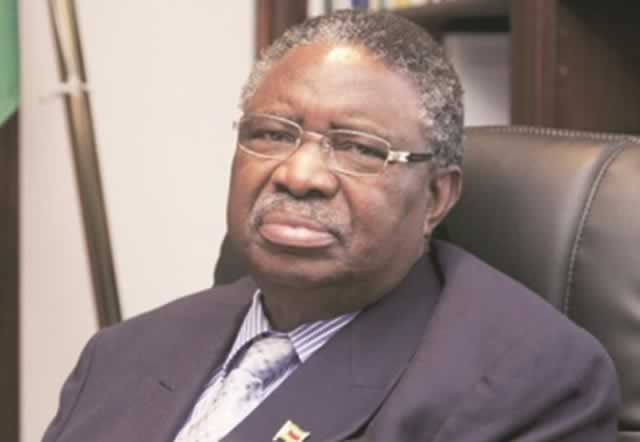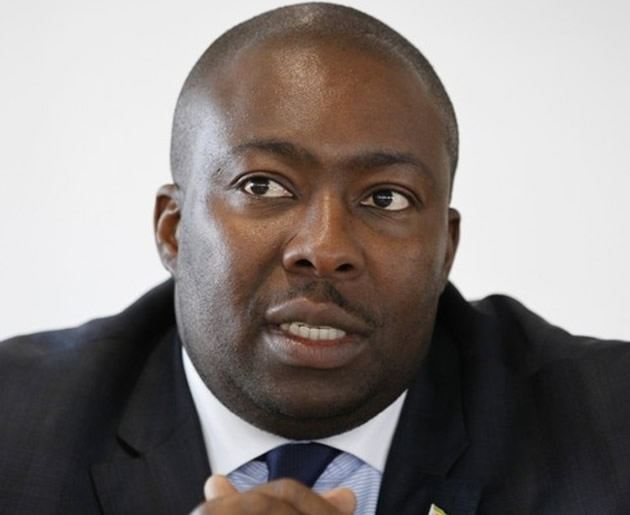VP Mphoko speaks out

 Lovemore Mataire Senior Reporter
Lovemore Mataire Senior Reporter
Newly appointed Vice President Phelekezela Mphoko (pictured) has revealed that some former Zapu cadres wanted to scuttle his appointment as Vice President by claiming that he was not a Zanu-PF card-carrying member.
In an interview on Friday, VP Mphoko said the smear campaign failed because everyone knew that he was a bona fide card-carrying member by virtue of him being in the Central Committee.
“I am aware that there were forces (in the region) that tried by all means to prevent me from being appointed VP saying I have not been a Zanu-PF card-carrying member until recently and I have not been in touch with the situation in the country because I have been out of the country for too long.
“But everyone knows that you cannot be a member of the Central Committee of Zanu-PF unless you are a member of the party. I was out of the country on assignment by the Head of State,” Cde Mphoko said.
VP Mphoko said the fact that he was a career diplomat for a long time did not disqualify him from the Vice Presidency position.
On his assumed lack of national appeal, Cde Mphoko said he was not a man used to too much publicity but was a committed freedom fighter and nationalist who executed well all assigned national duties.
He said cadres from both former Zanu-PF and Zapu were aware of his unquestionable national contribution before and after the liberation struggle.
Cde Mphoko said he was part of the first executive of the Zimbabwe National Liberation War Veterans’ Association, which had among other members, the late Cde Chris Pasipamire and Herbert Matanga.
He expressed hope that his strong cordial friendship with South African President Jacob Zuma would be helpful in further strengthening relations between Zimbabwe and its neighbour across the Limpopo.
The Vice President said he met Cde Zuma in Mozambique in 1975 when he was part of the Zipra contingent in the short-lived Zimbabwe People’s Army (Zipa) during the liberation struggle.
Zipa was the brainchild of the Frontline Heads of State comprising the late founding presidents Julius Nyerere of Tanzania, Samora Machel of Mozambique and Kenneth Kaunda of Zambia.
It unified Zipra and Zanla, the military wings of Zapu and Zanu-PF, respectively.
The unified military body comprised Cdes Rex Nhongo (commander), Dzinashe Machingura (deputy political commissar), Hondo (head of operations), James Nyikadzinashe (deputy security and intelligence), Saul Sadza (deputy logistics), Parker Chipoyera (deputy training), Webster Gwauya (head political affairs), Tendai Pfepferere (deputy medicine) who were all from the Zanla military wing.
The Zipra military wing comprised Cdes Nikita Mangena (political commissar), John Dube (deputy commissar), Enoch Tschangane (deputy operations), Gordon Munyanyi (head security and intelligence), Report Mphoko (head logistics), Ambrose Mutinhiri (head training), David Moyana (deputy political affairs) and Dr Augustus Mudzingwa (head medicine).
It was during his stint in Mozambique as part of Zipa that he developed a strong working relationship with President Zuma, who at the time was in the ANC intelligence. He also managed to develop strong ties with the late Mozambican president Machel’s family. It was in Mozambique that Cde Mphoko met his wife, Luaurinda, who is close to the Machel family.
“I was commander of the Wankie Operations in 1972, when we formed the Joint Command with ANC’s Umkhonto we Sizwe, which included Cdes Chris Hani, Joe Modise and John Dube. It is after that operation that I later went to Mozambique as part of Zipa. As a matter of fact, Zuma was the best man at my wedding in 1977 and that shows you how strong our relationship was. Sentimental ties are very strong, stronger than diplomatic,” said Cde Mphoko.
Cde Mphoko dismissed as futile attempts by Dr Dumiso Dabengwato to revive Zapu saying the Unity Accord (of 1987) signed between President Mugabe and the late Vice President Joshua Nkomo still subsisted.
“It is surprising that Dabengwa claims to be reviving Zapu because he was a pivotal player in the unity between Zapu and Zanu as early as 1972. We were together in Mbeya and as chairman of the revolutionary council he was the one responsible for sending myself and Lookout Masuku to go and talk to the Zanu leadership about the need for unity. The unity which was later sanctified by the Unity Accord of 1987 has its roots during the struggle and Dabengwa is aware of that,” Cde Mphoko said.
A politician, diplomat and former military commander, Cde Mphoko served as Zimbabwe’s Ambassador to Botswana, Russia and later South Africa.










Comments